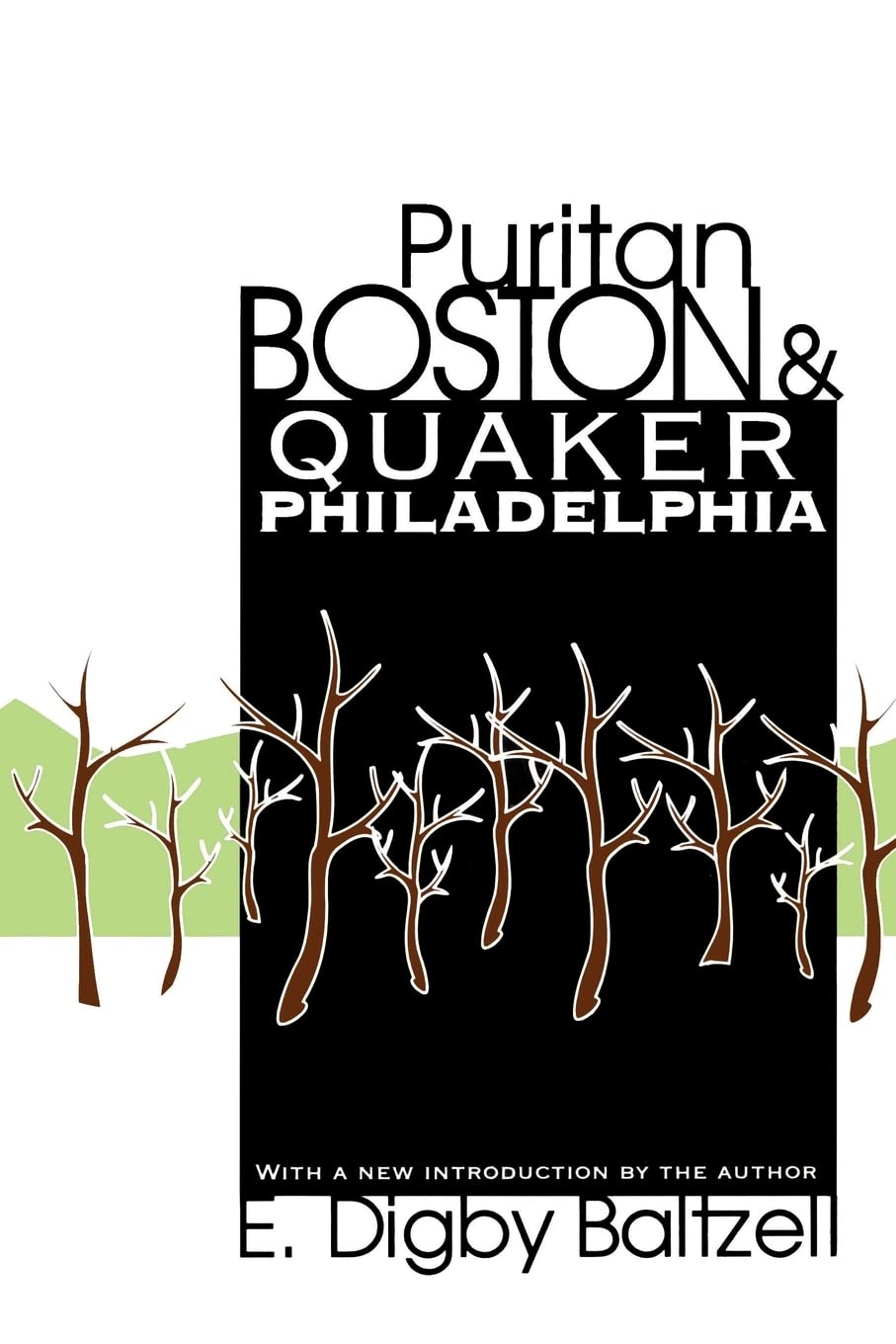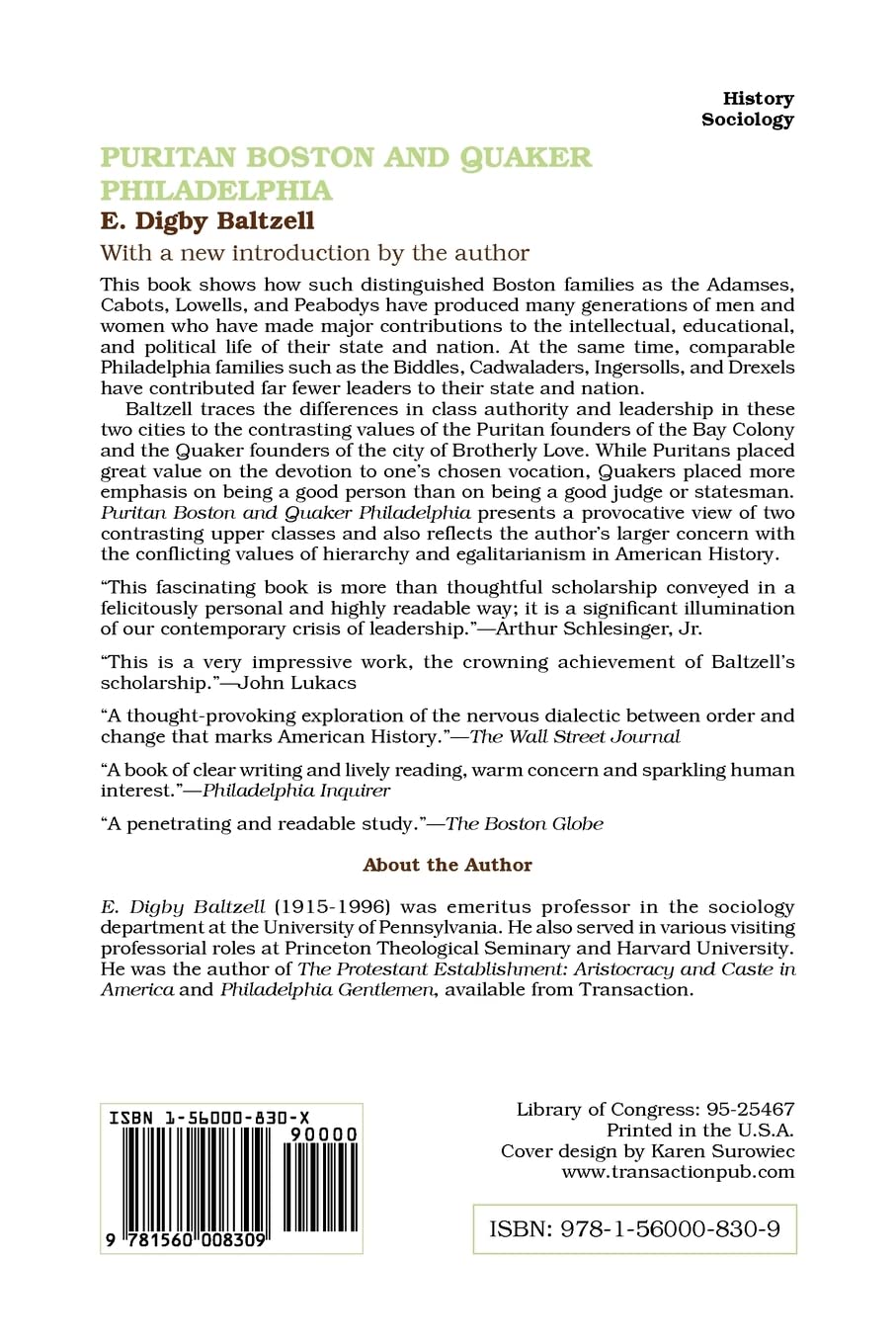Customer Services
Copyright © 2025 Desertcart Holdings Limited



Puritan Boston and Quaker Philadelphia
A**S
Authoritarian vs. Libertarian Utopias
A thorough, detailed, and fascinating sociological analysis of the Puritan and Quaker mindsets and the influence they exerted over the respective cultures they founded in Boston and Philadelphia even long after their obvious dominance had subsided.Both denominations were lower-class English utopian sects generated by the Protestant Reformation seeking a return to basic primitive purity in the Garden of Eden of the New-World Promised Land. The Calvinist Puritans set great store in education, and became accustomed to being governed by the leaders of their congregations. Quakers, on the other hand, carried Pietist individualism to the extreme with deliberate absence of governing authority and even structure. While the Puritan clergymen became educated statesmen in the communities of Massachusetts Bay, the individualistic Quakers let their consciences be guided by mystical personal revelations, and refrained from interfering in any non-Quaker's affairs (although extremely strict with fellow Quakers), assuming a consensus would emerge among the spiritually like-minded (i.e., public opinion). This attitude was also obviously congenial to the Pietist German Protestant utopian sects recruited to populate an outer belt of counties surrounding Philadelphia.The coercive Puritans of Massachusetts Bay guarded their religious dogma jealously and imposed it upon all members of their communities. Creating educational institutions which reinforced their intellectual orthodoxies, their leadership formed a hereditary ruling caste which even became known as Brahmins after the priestly Indian estate. When they converted from Puritan to Unitarian, their entire communities converted in lockstep, adhering to the Old-World concept of religious uniformity within each State, a characteristic of Reformation Geneva, and in particular the English consolidation of civil and spiritual control. They gave credence to the sanctity of the civil authority, as well as its conformity with the religious authority. When Roman Catholicism became predominant, the Catholic Church wielded more influence in Boston than anywhere else in the nation. The evangelistic Puritan temperament and forceful educational institutions (branded by Thomas Jefferson as breeding grounds for extremist absolutists and monarchists) came to dominate not only other colonies which they spawned, but also neighboring cultures and even eventually the nation as a whole.Quaker educational institutions, on the other hand, tended to stress practical scientific and vocational rather than philosophical training, which Taoist Quakers considered responsible for propagating erroneous superstitious rituals accumulated over time by all the ancient religions (Francis Bacon's "Idols of the Theater"). Philadelphia high society (although soon becoming predominantly conventional Anglican/Episcopalian, as did the feudal proprietary Penn family, at odds in many respects with Quakerism) grew accustomed to ceding its government to fanatical outside strongmen who controlled police departments, and lower-class political machines, which filled the vacuum and left them free to pursue their individual interests. Relatively few of the establishment ever sought or achieved the widespread personal acclaim so avidly pursued by their Massachusetts counterparts. To the Calvinist Puritans, politics was a reputable calling, whereas Philadelphia high society considered it an unsavory and contemptible occupation (a self-fulfilling prophesy).Strains of these two contrasting creeds both continue to assert themselves in control of U.S. culture to the present day. Historian David Hackett Fischer later expanded upon this theme in his book 'Albion's Seed,' viewing the American Civil War as a resumption of the English Civil War featuring the same ideologies clashing.The author's methodology comparing quantity of entries in the Dictionary of American Biography grows a bit tiresome to the lay reader, although it presumably has some validity.
C**D
Fascinating study of social leadership in America
Digby Baltzell uses the history of Philadelphia and Boston as very real examples of two types of leadership. In Boston, the "Boston Brahmin" elites formed a strong upper class that was not tolerant, certainly, but took responsibility for community life and exercised a tremendous influence on American culture, politics, arts, and science. In Philadelphia, the "Proper Philadelphians" were charming, tolerant--and deeply irresponsible, abandoning any role in governing the city and making it by common agreement the worst run city in the United States. When Philadelphia needed a mover and shaker, it imported some one from outside, like Ben Franklin.Baltzell takes these difference back to the colonial period and the dramatic differences in the viewpoints of the Puritans who founded Boston and the Quakers who founded Philadelphia. He also sees these changes working forward as the old upper-class socialize immigrant elites into their respective patterns, producing the Kennedy clan out of Boston, and Grace Kelly out of Philadelphia. Many of the points here can also be seen in David Hackett Fischer's Albion's Seed.Baltzell's bedrock conviction is that every society needs an upper class and is going to get one whether it likes it or not (the history of revolutions proves this rather conclusively). Those who see the very fact of social stratification as an personal affront will of course get affronted. The interesting point he makes though is that many things anti-elitists think are opposites actually go together. As he shows from his examples, social tolerance goes together with a much more blatantly money-conscious and just plain richer upper-class, and societies with widespread hostility to "elites" also show deep cynicism about their leadership and society in general, a cynicism merited by the generally short-sighted and narrowly (as opposed to broadly) selfish behavior of the upper class.Does this sound familiar? Baltzell's final point is that in the wake of the sixties, which he compares to the English civil war (1640-1660) environment that spawned the Quakers and released "a host of self-righteous seekers" on the land," American leadership has moved much closer to the nakedly plutocratic and irresponsible leadership model found in Philadelphia. And along with this change in the upper class has grown egalitarianism, openness to immigrants, cynicism, leadership gridlock, and social tolerance. The irony of communal utopianism producing results exactly opposite of what was intended would not have surprised de Tocqueville, Baltzell's great mentor in sociology.Don't think that this book is just about grand theory--it is filled with a host of fascinating portratits of the two cities' upper classes, and so contains a good deal of the achievers of America from colonial days to World War II. The simple quantitative analysis is effective and not off-putting.
G**R
Not impressed
One reviewer said they couldnt put the book down. I didnt have any problems putting it down. Tried several times to get into it. As a Quaker, I felt there was a hint of bias against Quakers. I read about half of the book and decided to move on to something else.
Trustpilot
3 weeks ago
2 weeks ago